Investing in the Future: Spring 2025 Stony Brook Venture Challenge
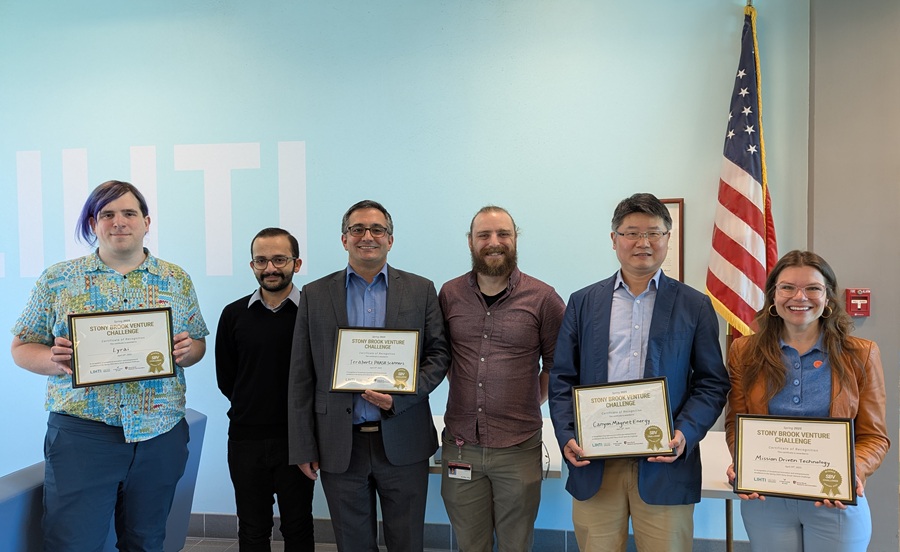
The Long Island High Technology Incubator (LIHTI) held its Spring 2025 Stony Brook Venture (SBV) Challenge, tasking 14 startups with creating a 10-minute presentation describing their business to a panel of judges.
“We run this challenge to identify high-potential ventures to receive more dedicated support for turning their concepts into successful businesses,” said Andrew Wooten, executive director for LIHTI. “I am pleased with the ongoing strength of the deep tech venture pipeline at Stony Brook University and the surrounding Long Island innovation ecosystem.”
LIHTI is a mixed technology incubator assisting Long Island hard tech companies since 1992. As a non-profit organization dedicated to helping new technologically innovative companies and strong ties to Stony Brook University’s Office for Research and Innovation, LIHTI is now working with Research and Innovation on a comprehensive strategy for building an inclusive, thriving and dynamic startup ecosystem. LIHTI’s proximity on the Stony Brook University campus creates a supportive environment to transfer cutting-edge ideas from the University to the private sector.
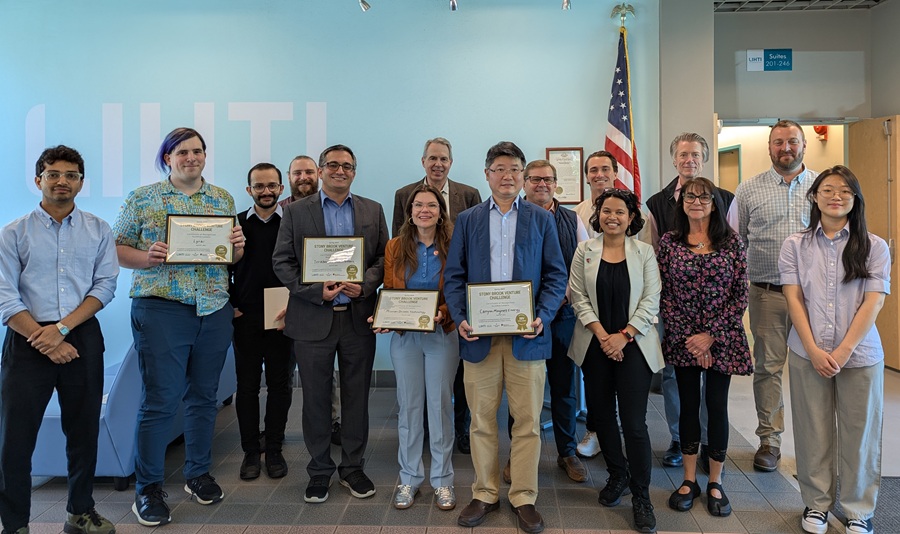
“The SBV Challenge is a great example of how Stony Brook focuses on getting new, innovative technology out of the laboratory and into society,” said Kevin Gardner, vice president for research and innovation at Stony Brook University. “Technology-based companies are the lifeblood of American prosperity and the Long Island economy, and Stony Brook inventions continually lead to new company formation, wealth creation and jobs on Long Island.”
“SBU is dedicated to enabling and expanding innovation and entrepreneurship, not just on campus, but to realize the extraordinary untapped potential all throughout Long Island,” said Michael Kinch, chief innovation officer at Stony Brook.
This year, 14 startups competed in the April 29 event in three tracks: Health, Energy, and Information. Four prizes were awarded: two in the Health track, and one each for Information and Energy. Winners receive $5,000 awards to use towards commercialization activities and continued support and guidance from LIHTI.
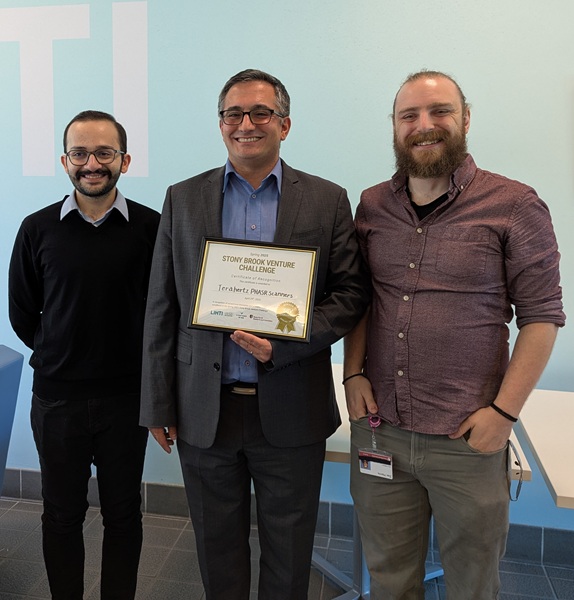 TeraHertz PHASER was one of two winners in the Health track
|
“The pitch competition is a vital tool for pipeline identification and initial diligence for LIHTI,” said Shruti Sharma, associate director, Venture Development for LIHTI. “Through the SBV Challenge, we gain valuable insights into both the technologies and the founders behind them. After the pitch competition concludes, a lot of long-term, curated support kicks in such as timely and warm introductions to resources in our networks as well as opening doors to exclusive, invite-only opportunities.”
The ventures each answered a round of questions to conclude their pitch. The event follows the success of the debut challenge held in the Fall of 2024.
After the final presentations, TeraHertz PHASER and Mission-Driven Tech were awarded in the Health track, Canyon Magnet Energy won in the Energy track, and Lyrai won in the Information track.
Hassan Arbab, an associate professor in Stony Brook’s Department of Biomedical Engineering, is the inventor of the TeraHertz PHASER scanner. “It’s a new imaging modality that you can sort of think about as the new ultrasound that doesn’t exist right now.”
Arbab said the scanner got its name from its resemblance to the phaser guns in the classic sci-fi TV series Star Trek.
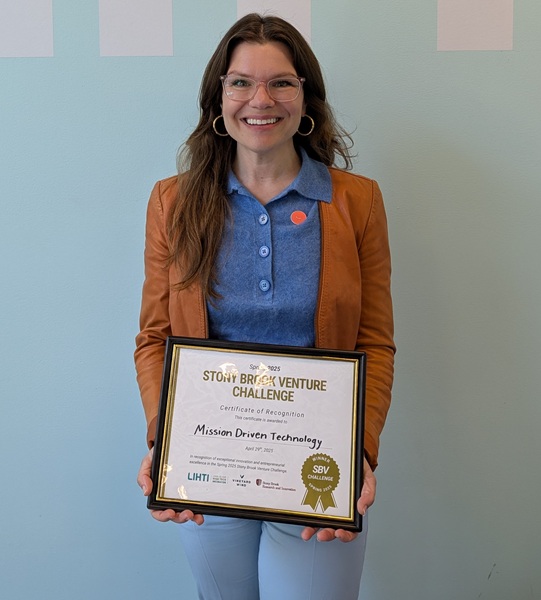 Eve McDavid, CEO and founder of Mission-Driven Tech
|
“It’s basically the same kind of electromagnetic light that you have in the airport whole body scanners, where you put your hands up and it scans around you,” said Hassan. “But instead of generating one frequency of light, it generates thousands of spectral frequencies towards the tissue and looks at the spectrum that’s turned back to try to diagnose and make diagnostic decisions. Our applications are currently mostly focused on skin burns, but there are other types of wounds and illnesses that we can go after. We have a new NIH grant to look at imaging into the cornea.”
Mission-Driven Tech, a cervical cancer innovation company transforming gynecologic cancer care with modern technology, was also awarded in the Health track.
“We’re laser-focused on improving the stagnant survival rates in the field,” said Eve McDavid, CEO and founder. “If a woman is diagnosed with cervical cancer today, she’s just as likely to die from her diagnosis as she was in 1970.”
McDavid said that for a patient undergoing brachytherapy today, the applicators used would be from the early 1970s.
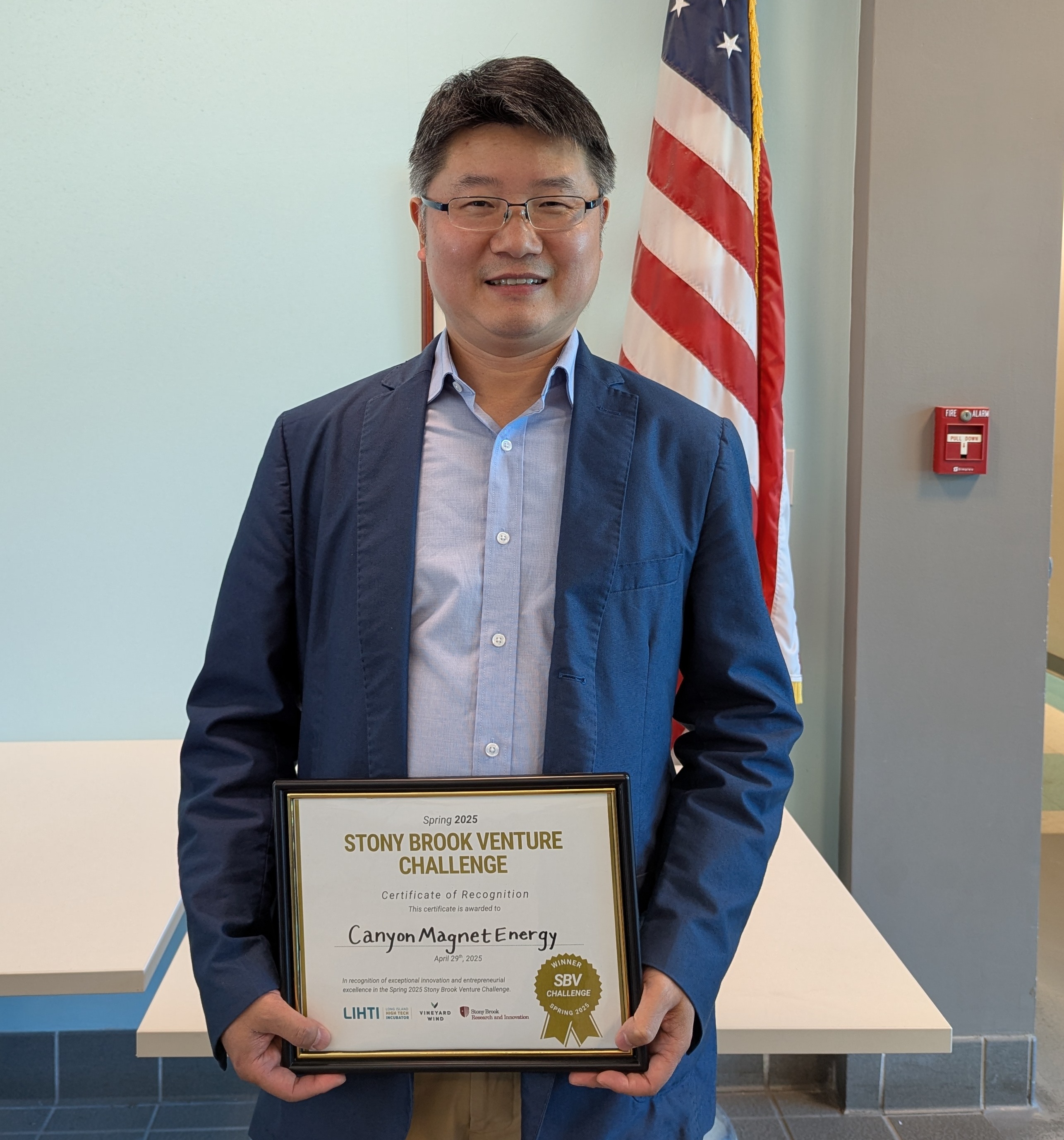 Honghai Song, Canyon Magnet Energy CEO
|
“We have invented a modern applicator that improves the fit and the efficacy,” she said. “And through our collaborations with another academic research institution at Virginia Commonwealth University, we’ve also identified a way to improve the dosimetric plan quality for improved precision in these treatments so that the women who undergo them have an improved ability to complete the treatment, a better outcome, and improved survival and outcomes overall.”
Canyon Magnet Energy develops high-quality and stable rare-earth barium copper oxide (REBCO) magnets that enable the ultra-high power densities required for quantum computing, fusion energy systems, and clean energy applications.
“Our goal is to address future energy needs with high-temperature superconductor magnets,” said Honghai Song, the company’s CEO and founder and an expert in superconducting magnets. “We’re working to improve the energy efficiency and also produce limitless clean energy with high fusion energy generation.”
Lyrai, which specializes in creating AI-powered digital acoustic twins of architectural spaces, won in the Information track.
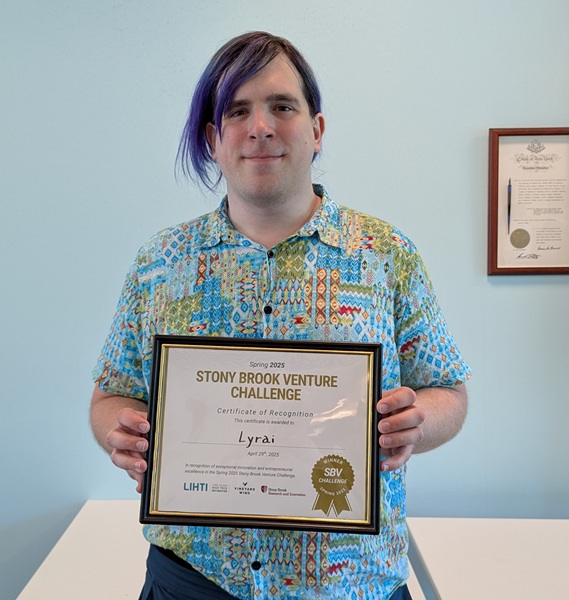 Robert Pond of Lyrai
|
“Lyrai is looking to do acoustic simulation by creating acoustic twins of physical spaces and simulating acoustic treatment within them,” said Robert Pond ’14, a recording engineer at Lyrai. “We’re hoping to make the field of acoustics a lot more data driven, and also a bit more cost-effective for concert halls, theaters, restaurants or other gathering spaces.”
Evgenii Boriushkin, whose company Tropocan was awarded at the first SBV challenge, was in attendance, and gave an update on his company’s progress.
“We’re developing therapy for brain tumors and brain metastasis,” said Boriushkin, CEO of Tropocan and a research scientist at the Stony Brook Cancer Center. “Since last year we’ve really proven the concept. We’ve tested on mice and the findings show our drug can be effective. We have two compounds that could really be drug candidates, and we need to prove that it will be safe in mice and animals to start clinical trials. Being part of LIHTI and the Stony Brook University network has provided the support needed to bring our vision to life.”
“I’d like to thank everyone who made this happen, especially all the companies and ventures,” said Sharma. “In just one month, from the first time that the applications came into the final presentations, there is already a lot of progress. Keep up the good work.”
